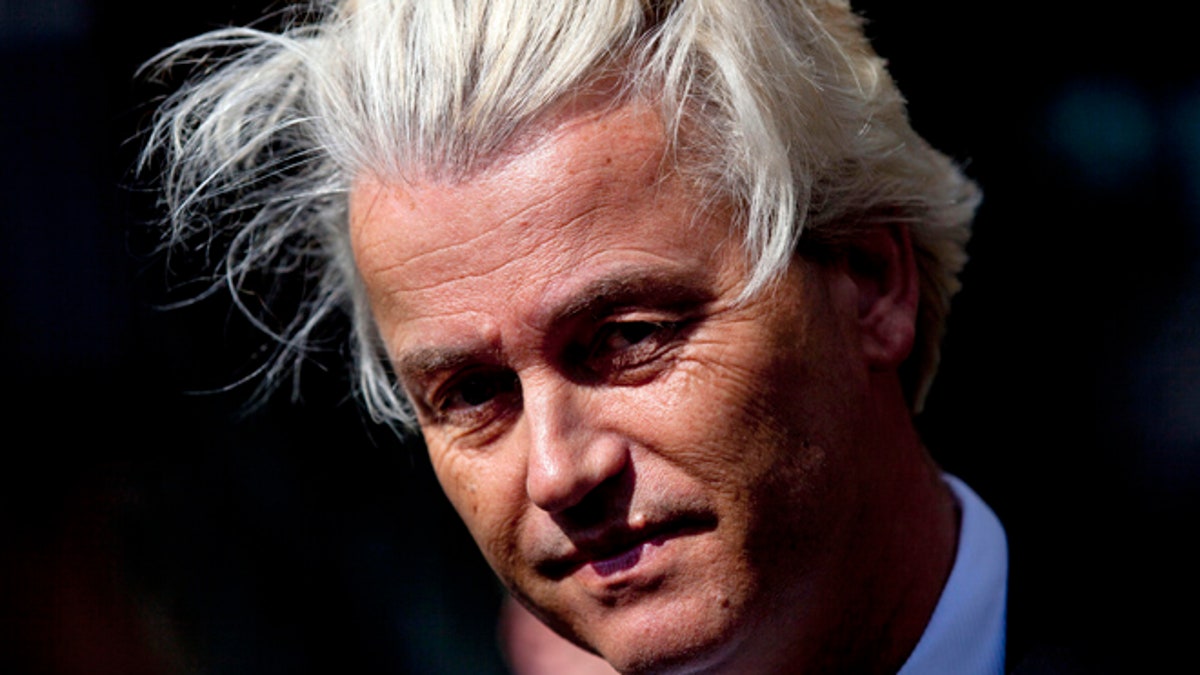
May 12, 2014: Dutch lawmaker Geert Wilders pauses, as he speaks to journalists outside the Dutch National Bank in Amsterdam. (AP)
A Dutch court’s decision to find Geert Wilders -- the leader of the right-wing Party for Freedom -- guilty of hate speech for remarks he made on Moroccan immigration into the country is a massive victory not only for Wilders, but also for right-wing parties across Europe.
Wilders was found guilty of inciting discrimination for asking a crowd in 2014: “Do you want more or fewer Moroccans in this city and in the Netherlands?” When they answered “fewer, fewer,” Wilders replied: “we’ll take care of it.” The Dutch political establishment went into paroxysms of rage over this fairly standard statement of right-wing immigration policy.
In some ways the reaction, and the verdict, is not surprising. A key tenet of the modern Western liberal consensus is to ignore the public’s opinion in radically changing a country’s demographics via mass immigration. In America and across Europe, politicians have slipped into a cozy consensus on opening borders and shipping in immigrants from often-dangerous and third-world countries.
The labeling of Wilders’ views as “hate speech” in the first place is an effort to shut down debate. There is no distinction between free speech and the undefined “hate speech,” unless it directly tries to incite violence -- something Wilders did not do. Wilders’ crime, like other politicians who have been outspoken on immigration, is to dare to raise the issue at all and to challenge the open borders, multiculturalist consensus. The Wilders prosecution is the latest in a concerning trend of trying to shut down the discussion altogether.
The authoritarians behind this prosecution hope that by doing so, it will stymie the debate, and feed their narrative that Wilders is not a man of the people, but a swivel-eyed racist. But actually it will do the opposite.
The court case actually plays right into two arguments of the same populist narrative that is sweeping through the West and knocking over Western leaders like dominos -- namely that a) your government cares more about protecting immigrants than protecting you, and b) Islamic immigration in particular threatens your democratic freedoms.
Friday's verdict proves this isn’t a right-wing conspiracy, but a reality. It will therefore give Wilders, as well as the populist right in Europe as a whole, a big shot in the arm.
We have seen this play out in the Netherlands before. Wilders became a more mainstream and popular figure after 2011, where he was put on trial -- and later acquitted -- for insulting the Koran and Islam, comparing the religion to fascism.
The Dutch have been particularly sensitive to the dangers Islam poses to free speech after filmmaker Theo Van Gogh was brutally murdered in the street in 2004 by an Islamist after daring to make a film criticising the religion of peace. Friday’s case tells Dutch voters that the threat to their free speech is still real -- but that it is not just from Islam itself, but also from those running the country who care more about the rights of immigrants than of their own people.
Wilders’ Party for Freedom is leading in the polls right now ahead of the elections scheduled for March. Their numbers have risen during the trial. Expect the Party for Freedom, and similar parties across Europe, to surge in popularity in the wake of this outrageous verdict.
